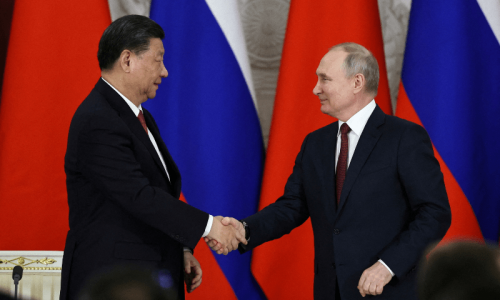BAGHDAD: After a year in power, Iraq’s prime minister stands accused of failing to seize chances to make painful changes required to stabilise the country. Nuri al-Maliki took power with the image of a strong man who could take tough decisions, particularly in curbing the Mehdi Army, a militia loyal to fiery cleric Moqtada al-Sadr, and which is accused of running sectarian death squads.
Officials from within and outside Maliki’s coalition admit that stabilising Iraq could be “mission impossible”, but they said Maliki should have reshuffled a weak government which has failed to deliver key services and security.
A series of US-backed security plans has failed to end the violence in the country and insurgents seem to have intensified their attacks outside the capital.
Some Sunni Arab officials say that Maliki’s advisers, most of whom come from Maliki’s Dawa party, have given the prime minister a distorted and biased image of the situation.
A senior Shia official said Sadr’s supporters, the Sadrists, had initially allowed Maliki to crack down on the Mehdi army.
“The Sadrists have given Maliki a great chance. A chance which they did not give and will not give to any prime minister – they gave him a green light to go after the militias,” said the official, who is not from the Sadrist bloc.
He said that Maliki’s weak government and incompetent security forces, which are infiltrated by militias, failed to make the most of that opportunity.
Analysts agree that Maliki’s government is not capable of controlling major parts of Iraq and ending violence.
“Everybody knows now that the government is not delivering. Maliki himself knows this and that is why he kept promising people a reshuffle,” a government official said.
Time is of the essence for Maliki.
The US commander in Iraq will make a progress report in September on the impact of a US military build up which has seen thousands of additional troops pour into Baghdad.
Washington wants targets key to ending the violence to be met by then. These “benchmarks” include constitutional change, an oil law to attract investments and ending a ban on Saddam Hussein's former Baath members from holding office.
Maliki, who was dependent on Sadr for political support, has promised many times to reshuffle his cabinet and to bring in more competent ministers. But his pledges have come to nothing.
Last month, Sadrists pulled their six ministers from the government and left it to Maliki to pick replacements.
But Maliki is now accused from within his coalition of being too keen to promote his personal favourites and aides from his own Dawa party.
Officials in the government defend Maliki by saying that Iraq’s fractured political system makes it difficult for one man to achieve major breakthroughs.
“You have to please everybody. Parliament, political factions, religious leadership, ethnic and sectarian groups are all on his list and he has to deal with all that,” said another Shia official.—Reuters











































Dear visitor, the comments section is undergoing an overhaul and will return soon.